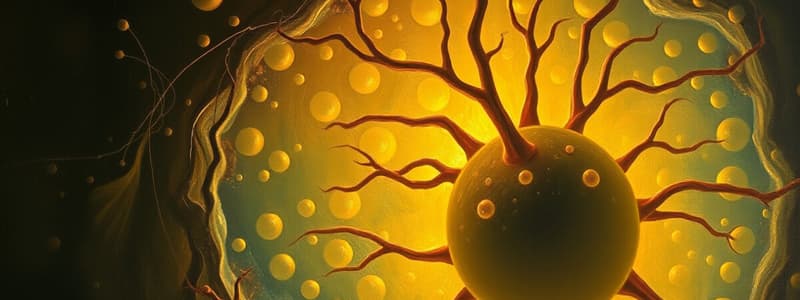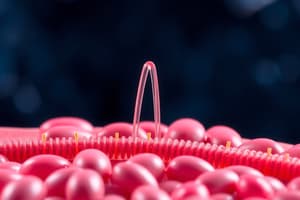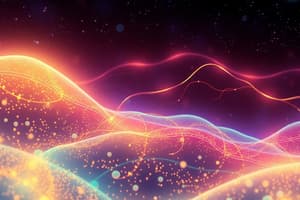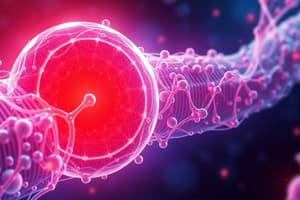Podcast
Questions and Answers
What determines the resting membrane potential?
What determines the resting membrane potential?
- Chloride ion activity
- Potassium channel selectivity (correct)
- Calcium ion concentration
- Sodium channel permeability
Which mechanism leads ions to diffuse through gated channels when they are open?
Which mechanism leads ions to diffuse through gated channels when they are open?
- Magnetic gradients
- Mechanical vibrations
- Thermal energy levels
- Chemical concentration gradients (correct)
What role do pore loop areas play in potassium channels?
What role do pore loop areas play in potassium channels?
- They aid in energy production
- They stabilize membrane potential
- They are important for selectivity filter (correct)
- They facilitate ion synthesis
What happens to the resting membrane potential in response to increased extracellular potassium concentration?
What happens to the resting membrane potential in response to increased extracellular potassium concentration?
What discovery is associated with the Shaker potassium channel?
What discovery is associated with the Shaker potassium channel?
How many subunits do potassium channels consist of?
How many subunits do potassium channels consist of?
Which scientist was awarded the Nobel Prize for research related to potassium channels?
Which scientist was awarded the Nobel Prize for research related to potassium channels?
What is the main factor influencing the resting membrane potential's sensitivity to external changes?
What is the main factor influencing the resting membrane potential's sensitivity to external changes?
What is the primary reason for the resting membrane potential being negative inside the cell?
What is the primary reason for the resting membrane potential being negative inside the cell?
How does the sodium-potassium pump contribute to the stability of the resting membrane potential?
How does the sodium-potassium pump contribute to the stability of the resting membrane potential?
Which of the following ions has the highest permeability in the resting membrane potential?
Which of the following ions has the highest permeability in the resting membrane potential?
What aspect most directly determines the resting membrane potential?
What aspect most directly determines the resting membrane potential?
Why are neuron membranes described as being permeable to more than one type of ion?
Why are neuron membranes described as being permeable to more than one type of ion?
What are channel proteins primarily responsible for in the neuronal membrane?
What are channel proteins primarily responsible for in the neuronal membrane?
Which level of protein structure refers to the coiling of the amino acid sequence into a helix or folding into a sheet?
Which level of protein structure refers to the coiling of the amino acid sequence into a helix or folding into a sheet?
What process allows dissolved ions to distribute evenly across the neuronal membrane?
What process allows dissolved ions to distribute evenly across the neuronal membrane?
What are amino acids joined together by to form polypeptides?
What are amino acids joined together by to form polypeptides?
Which type of protein is specifically mentioned as being responsible for energy use from ATP breakdown in neuronal signaling?
Which type of protein is specifically mentioned as being responsible for energy use from ATP breakdown in neuronal signaling?
What is defined as the force exerted on a charged particle in the neuronal membrane?
What is defined as the force exerted on a charged particle in the neuronal membrane?
Which disorder is linked to issues with channel proteins?
Which disorder is linked to issues with channel proteins?
How do polar and nonpolar R groups influence channel proteins in the neuronal membrane?
How do polar and nonpolar R groups influence channel proteins in the neuronal membrane?
What is the main function of enzymes as proteins in the neuronal membrane?
What is the main function of enzymes as proteins in the neuronal membrane?
Which term describes how easily electrical charges can move across a membrane?
Which term describes how easily electrical charges can move across a membrane?
What is defined as the measure of potential energy generated by separated charge?
What is defined as the measure of potential energy generated by separated charge?
Which equation represents Ohm’s law?
Which equation represents Ohm’s law?
What happens to current if resistance increases while voltage remains constant?
What happens to current if resistance increases while voltage remains constant?
What characterizes a conductor as opposed to an insulator?
What characterizes a conductor as opposed to an insulator?
What is required to maintain opposite charges separated across a membrane?
What is required to maintain opposite charges separated across a membrane?
At equilibrium potential (Eion), what occurs with ion movement?
At equilibrium potential (Eion), what occurs with ion movement?
What will occur if K+ channels are inserted into a phospholipid bilayer?
What will occur if K+ channels are inserted into a phospholipid bilayer?
What condition is necessary for greater current flow according to Ohm's Law?
What condition is necessary for greater current flow according to Ohm's Law?
Which of the following represents resistance?
Which of the following represents resistance?
When there is no net current flow between two points, what do those points have?
When there is no net current flow between two points, what do those points have?
What is primarily responsible for the large changes in membrane potential being influenced by tiny amounts of ion concentration changes?
What is primarily responsible for the large changes in membrane potential being influenced by tiny amounts of ion concentration changes?
Which equation allows for the calculation of the equilibrium potential for an ion?
Which equation allows for the calculation of the equilibrium potential for an ion?
Which ion is more concentrated inside the neuronal cell at rest?
Which ion is more concentrated inside the neuronal cell at rest?
How much ATP can be utilized by the sodium-potassium pump in the brain?
How much ATP can be utilized by the sodium-potassium pump in the brain?
What is the primary function of the calcium pump in neuronal cells?
What is the primary function of the calcium pump in neuronal cells?
What factor does the Nernst equation NOT take into account when calculating the equilibrium potential?
What factor does the Nernst equation NOT take into account when calculating the equilibrium potential?
What determines the rate of movement of ions across the membrane?
What determines the rate of movement of ions across the membrane?
What does the sodium-potassium pump achieve in terms of ion transport?
What does the sodium-potassium pump achieve in terms of ion transport?
Flashcards are hidden until you start studying
Study Notes
Neuronal Membrane Components
- Proteins are critical in neuronal membranes, composed of amino acids that construct enzymes, cytoskeletal elements, and receptors.
- Membrane proteins span the phospholipid bilayer, essential for regulating resting and action potentials.
Protein Structure
- Proteins consist of amino acids bound by peptide bonds to form polypeptides.
- Four levels of protein structure:
- Primary: sequence of amino acids
- Secondary: coiling into a helix or folding into sheets
- Tertiary: 3D shape from further folding
- Quaternary: assembly of multiple polypeptides into a functional protein.
Channel Proteins
- Channel proteins are integrated throughout neuronal membranes, allowing ion transport and creating selectivity and gating.
- Ion pumps are specialized channel proteins using ATP energy to facilitate neuronal signaling.
- Dysfunction in channel proteins can lead to various neurological disorders, including epilepsy and congenital insensitivity to pain.
Ion Movement
- Diffusion of dissolved ions leads to equal distribution, with ions flowing down concentration gradients through permeable channels.
- Electrical behavior influences ion movement; charges are attracted and create an electrical potential difference across membranes.
- Ion conductance and resistance govern the ease of charge movement, Halting conduction when resistance is too high.
Membrane Permeability
- Neuronal membranes exhibit differential permeability:
- Slightly permeable to Na+
- 25 times more permeable to K+ (due to greater availability of leakage channels)
- Permeable to Cl–, leading to negative internal charge.
- The sodium-potassium pump is crucial for maintaining resting membrane potential by expelling three Na+ ions for every two K+ ions brought in.
Resting Membrane Potential
- Results from differences in ion concentration and plasma membrane permeability.
- Neuronal membranes are more permeable to K+ ions, establishing a negative internal environment.
- Changes in external K+ concentration significantly affect membrane potential.
Principles of Electricity
- Membrane potential refers to voltage across neuronal membranes, critical in neuronal excitability.
- Equilibrium potential (Eion) occurs when there’s no net ion movement, balancing ionic concentration gradients across membranes.
- Opposite charges require energy to remain separated; current flows from high to low voltage due to differences in electrical potential.
The Nernst Equation
- The equation calculates equilibrium potential (Eion) based on:
- Ion charge
- Temperature
- Ion concentration ratios across the membrane.
- K+ ions are primarily concentrated within the cell, whereas Na+ and Ca2+ ions are more abundant outside.
Ion Regulation Mechanisms
- Sodium-potassium pump actively moves ions against concentration gradients (3 Na+ out, 2 K+ in).
- Calcium pumps are responsible for transporting Ca2+ out of the cytosol.
- Energy-intensive process, consuming up to 70% of total brain ATP.
Key Takeaway
- Understanding ion movement and membrane dynamics is crucial for grasping neuronal signaling processes and disease mechanisms.
Studying That Suits You
Use AI to generate personalized quizzes and flashcards to suit your learning preferences.




